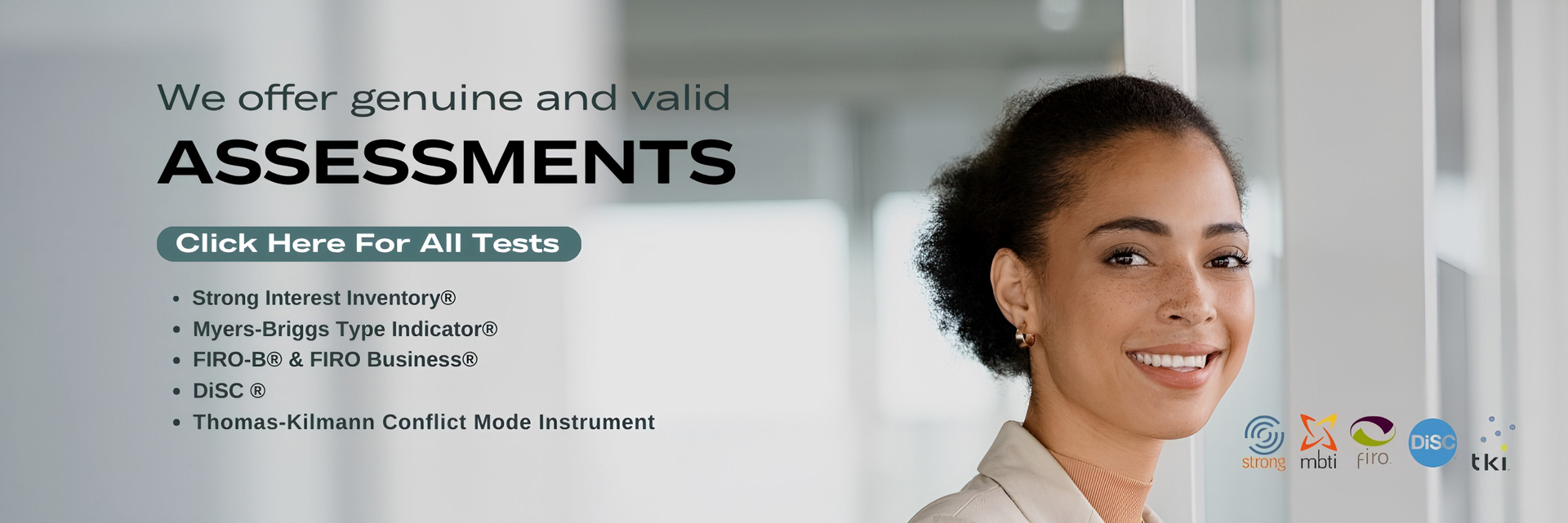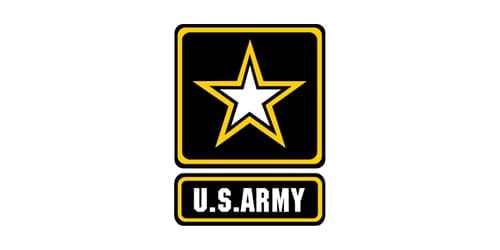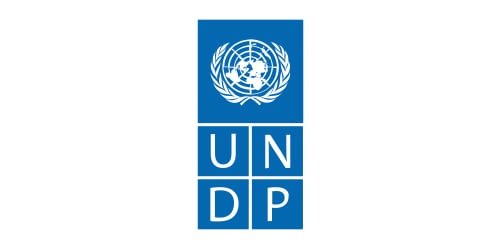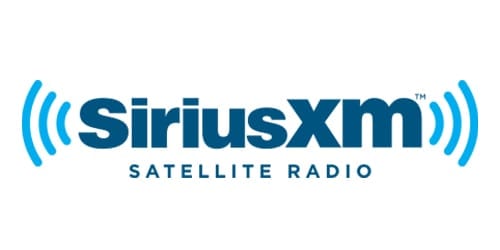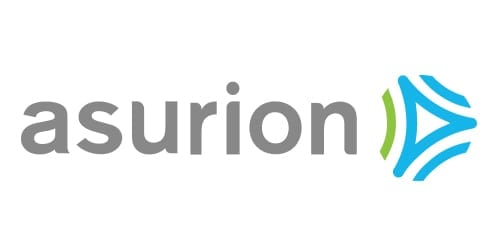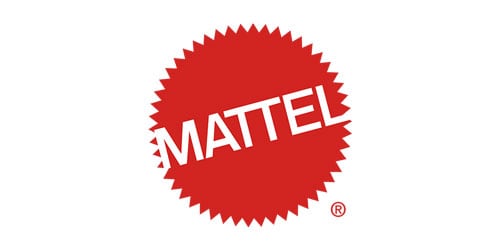
Bulk Pricing Available
Featured Career Assessments
-
MBTI® Career Report + Strong & MBTI Combined Career Report + Strong Profile
Price: $94.95 Buy NowDIGITAL DELIVERY
- Three of the top career-focused tests included
- Designed to uncover the best career fit for your true self
- Links to complete assessments are sent digitally via email within 2-3 business hours of purchase
- Results sent in PDF form via email within 6-8 business hours
Sample Reports of Each Included Test:
-
Ultimate Career Package
Price: $129.95 Buy NowDIGITAL DELIVERY
This is the ultimate career development package- an exclusive Career Assessment Site package with reports chosen by our senior staff. Gain access to our most in-depth option for uncovering and analyzing the interest patterns in your innate personality, and how that translates to the professional landscape.Included Reports:
- Myers-Briggs Type Indicator® Career Report
- Strong Interest Inventory® and Myers-Briggs Type Indicator® Combined Career Report
- Strong Interest Inventory® Profile
- Skills Confidence Profile
- Strong Interest Inventory® Interpretive Report
- Links to complete assessments sent digitally via email within 2-3 business hours of purchase
- Results sent in PDF form via email within 6-8 business hours.
Download sample MBTI® Career Report
Download sample Strong Interest Inventory® and MBTI® Combined Career Report plus Strong Profile
Download sample Strong Interest Inventory® & Skills Confidence Profile + Strong Interest Inventory Interpretive Report -
Strong Interest Inventory® 244 Career Satisfaction Report
Price: $64.50 Buy NowDIGITAL DELIVERY
- Connect your interest patterns to a wide range of potential career paths
- This edition of the test now includes 243 occupations and a far larger data sample size
- Links to complete assessments sent digitally via email within 2-3 business hours of purchase
- Results sent in PDF form via email within 6-8 business hours.
Download Sample Strong Interest Inventory® 244 Career Satisfaction Report
-
Strong Interest Inventory® & Skills Confidence Profile + Strong Interpretive Report
Price: $64.95 Buy NowDIGITAL DELIVERY
- Better understand your strengths, interests, preferences, and areas of confidence
- Connect your innate traits to a successful and satisfying career
- Links to complete assessments are sent digitally via email within 2-3 business hours of purchase
- Results sent in PDF form via email within 6-8 business hours
Download sample Strong Interest Inventory® & Skills Confidence Profile + Strong Interpretive Report
-
Strong High School Edition Profile plus Interpretive Report
Price: $62.95 Buy NowDIGITAL DELIVERY
High School is the perfect time to explore the focus of your child’s curriculum, career future and extra curricular activities by maximizing the feedback of your results with the Strong Interest Inventory High School Edition Profile plus Interpretive Report package.Use this powerful combination of two effective and scientifically recognized reports to further your child’s career exploration efforts. This 21-page, two-report package takes your child beyond the stand-alone Strong High School Edition Profile by adding the informative Strong Interpretive Report for additional insight. Find what occupations may be good matches based on interests and identify educational programs and work environments that would best fit your child or student during their high school years as they prepare for the future.
Please note: A minimum age of 14 and a 9th grade reading level is recommended for this report. See “More Details” for additional technical information.
- Links to complete assessments are sent digitally via email within 2-3 business hours of purchase
- Results sent in PDF form via email within 6-8 business hours
-
MBTI® Career Report
Price: $62.50 Buy NowDIGITAL DELIVERY
- Receive an in-depth 10-page report on your occupational matches
- Explore your preferred work tasks, environments, and industry matches
- Assessment sent digitally within 2-3 business hours of purchase
Comprehensive Career with College Insight Assessments
-
MBTI® Career Report + Strong & MBTI Combined Career Report + Strong College Edition Profile
Price: $94.95 Buy NowDIGITAL DELIVERY
- Identify your ideal career path + develop a college plan to achieve it
- Connect your innate personality and interests to a college major, and in turn to a fulfilling profession later in life
- Links to complete assessments are sent digitally via email within 2-3 business hours of purchase
- Results sent in PDF form via email within 6-8 business hours
Download sample MBTI® Career Report
Download sample Strong & MBTI Combined Career Report + Strong College Edition Profile Report
Download sample Strong Interest Inventory® College Edition Profile Report -
Strong Interest Inventory® & Skills Confidence Profile + Strong College Edition Profile + Strong Interpretive Report
Price: $64.95 Buy NowDIGITAL DELIVERY
- Get a complete picture of your perceived skills and interests
- Connect your college major and future career path to what aligns with your true self
- Links to complete assessments are sent digitally via email within 2-3 business hours of purchase
- Results sent in PDF form via email within 6-8 business hours
-
Ultimate College Package
Price: $129.95 Buy NowDIGITAL DELIVERY
This ultimate college package is an exclusive Career Assessment Site offering with reports chosen by our senior staff. Identify your core personality traits and connect them to goals for college study and future career paths.Includes The Following Five Reports:
- Myers-Briggs Type Indicator® (MBTI®) Career Report
- Strong Interest Inventory® and Myers-Briggs Type Indicator® Combined Career Report College Edition
- Strong Interest Inventory® College Edition Profile
- Skills Confidence Profile
- Strong Interest Inventory® Interpretive Report
- Links to complete assessments are sent digitally via email within 2-3 business hours of purchase
- Results sent in PDF form via email within 6-8 business hours
Download sample MBTI® Career Report
Download sample Strong Interest Inventory® and MBTI® Combined Career Report College Edition
Download sample Strong Interest Inventory® College Edition & Skills Confidence Profile + Strong Interest Inventory® Interpretive Report -
Strong Interest Inventory® College Edition Profile Plus Interpretive Report
Price: $62.95 Buy NowDIGITAL DELIVERY
Plan your collegiate and career future based on your interests with additional analysis and guidance.Expand on the career focused recommendations and collegiate insight found in the Strong College Edition Profile with 9 additional pages of interpretive feedback found in this extensive 23 page Strong College Edition Profile plus Interpretive Report package. Find your best fit career path based on comparative analysis utilizing your like and dislike patterns when compared with other happy employees within 130 career families while receiving College based tips on optimal time management and major selection.
- Links to complete assessments are sent digitally via email within 2-3 business hours of purchase
- Results sent in PDF form via email within 6-8 business hours
Download Sample Strong College Edition Profile plus Strong Interpretive Report
Check out our Infographics
Learn More
About the Strong Interest Inventory Test
The Strong Interest Inventory® test is an assessment that helps people discover what they'd enjoy doing with their work and their free time.
All about the Myers-Briggs Type Indicator
Everything you need to know about the MBTI and what the personality types mean for your everyday interactions.
About the MBTI
Step II Test
The MBTI Step II assessment helps you to address the individual differences within each Myers-Briggs personality type.
About the
FIRO-B Test
The FIRO-B Assessment provides a score that is used to estimate how comfortable an individual is with a specific behavior.
About the Thomas-Killman Instrument
The TKI test is a self-report questionnaire designed to measure how one deals with interpersonal conflict.
About the
FIRO Business Test
The FIRO Business test was created for businesses who want to get the most out of their teams and leaders.
MBTI Reliability
and Validity
Strong Inventory Reliability and Validity
The Strong Interest Inventory® Assessment was designed to help job-seekers find careers that are most suitable.
About the 16 MBTI Personality Types
Learn all about the 16 Myers-Briggs personality types, which can help you to identify your strengths and best traits.
Myers-Briggs and Loving Relationships
Explore each of the four opposite pairings and their various interactions based on your personality characteristics.
Myers-Briggs
Career Resource
Find out in-depth information about what careers could appeal to you based on your Myers-Briggs personality type.
MBTI Personality Types
in the Workplace
Find out how your personality type interacts in the workplace and how you can improve your inter-office relations.
Strong Career
Resource
Our Strong Career Resource can help you find careers that work well with your Strong Interest Inventory Theme Code.
MBTI Personality Types and College Planning
Learn about how your Myers-Briggs® Personality Type can play a key role in college planning and stress management.
Myers-Briggs Personality Career Tips
Discover helpful information about your MBTI personality type and how you can better your career with our tips.
Famous Celebrity
MBTI Types
Find out what Myers-Briggs personality types your favorite celebrities share, including ones that match your own.
Strong Interest Inventory FAQs
Read about the most frequently asked questions (FAQs) and important details of the Strong Interest Inventory Assessment.
How Does the Strong Interest Inventory Work?
The key to your career journey is finding a guide that is reliable. Learn how the Strong Interest Inventory® can be your guide.
Carl Jung:
Biography in Short
Learn more about psychotherapist and psychiatrist Carl Gustav Jung, a pioneer in the study of extraversion and introversion.
Personality Biases and Differences
Read more about how MBTI preferences can give us a roadmap of awareness of our differences and our human biases.
What is the rarest personality type?
Read about the characteristics of the rarest personality type and what makes it so unique.
Myers-Briggs® Personality Types and Change
See how each MBTI Personality Type deals with change in life and in the workplace.
Are you born with your Myers-Briggs Type?
Are you born with your Myers-Briggs Type?
Let’s take a closer look at how we know that your Myers-Briggs® Personality is innate.
What is the Most Common Myers-Briggs Personality Type?
Find out more about the Myers-Briggs ISFJ Personality Type and why it occurs more than the others.
What is the Most Complex Myers-Briggs Personality Type?
Let’s examine INFJs and why this personality type is so complicated.
Why is The MBTI® Assessment So Popular?
Let’s take a closer look at why MBTI became popular to begin with and how it maintains its popularity today.
Where to take the Strong Interest Inventory
Learn everything you need to know about the Strong Interest Inventory® test itself.
About
Career Assessment Site
At Career Assessment Site we offer variations of personality, professional, college, high school, business and career assessments. These include The MBTI® (Myers-Briggs Type Indicator®) Instrument, The Strong Interest Inventory® Instrument, The Thomas Kilmann Conflict Mode Instrument (TKI), and the FIRO-B®.
- The MBTI test is used in many areas of growth including personality, career, and college major exploration.
- The Strong Interest Inventory test is a proven and powerful interest inventory used to help you find your best-fit career by matching you with your interests, learning styles, and other indicators.
- The TKI instrument measures how you handle conflict, and how often you avoid, compromise, accommodate, compete, and collaborate.
- The FIRO-B Profile assesses your interpersonal behavior preferences by identifying how you tend to behave toward others and how you want them to behave toward you.

Why Buy From Us
100% Safe & Secure Shopping
Best Prices
Only Validated and Genuine Assessments
Top-Notch Interpretive Care
Outstanding Customer Service
User-friendly Digital Platform

Questions? We're Here For You.
Contact us with any questions and we'll be happy to assist you.
What is a Career Assessment?
Career Assessments are data-driven tools that are specifically designed to analyze multiple aspects of job seekers’ professional goals and personality characteristics. The assessment then applies that analysis to help the assessment taker to find fulfilling careers that leverage their strengths. Career assessments have been developed and refined by psychologists and industry leaders for nearly 100 years. In the last 30 years, vocational psychology has become a comprehensive field and today dozens of scholarly publications such as the Journal of Career Assessment have applied a broad range of analytical techniques--rating scales, interview procedures, and surveys--to build a solid scientific understanding and approach to career decision-making.
Experts have used this research to develop several categories of Career Assessments. The most common and most established category is called a Type Assessment, which sorts people into predetermined categories based on their test results. For example, the Myers-Briggs Type Indicator® (MBTI) Assessment is based on the work of renowned psychologist Carl Jung and uses an in-depth survey to determine which personality type best describe an individual and applies that analysis to guide job-seekers toward their best-fit careers.
In contrast, the Strong Interest Inventory® (SII) Assessment analyzes personal interests and preferences and then compares individual results to a robust database containing responses from thousands of professionals who are already practicing in their respective fields.
Multiple Career Assessments can be used together to increase their analytical power and get a more complete picture of one’s optimal career. Various combinations of the Myers-Briggs Type Indicator® and the Strong Interest Inventory® have helped individuals from all cultural backgrounds and walks of life find the careers they were meant to have.
Whether they are used individually or in combination, Career Assessments can help you discover your interests and preferences and then apply those insights to pursue a successful and satisfying career.
What is a Personality Test?
Personality Tests are designed to provide invaluable insights into many different aspects of how people function in their personal lives as well as in their place of work. They have been used for decades by individuals for their own self-improvement as well as by professionals, from therapists and career advisors to hiring managers and beyond, to gain perspectives of their customers, clients, or employees.
From a personal perspective, a personality test can help individuals better understand how they build and maintain personal relationships, including where they are most likely to connect and engage with others, the kinds of activities or even conversation topics they prefer, and even how they express disagreement or navigate sensitive social situations. This sharper self-perception can help people identify areas in which they would like to improve, perhaps becoming more patient or learning to explicitly express their own opinions and preferences rather than passively adopting those of the people around them. Personality tests can also provide the necessary tools to develop deeper, more meaningful relationships with partners, children, family, friends, and most importantly, with oneself. Whether overcoming a specific challenge or generally improving quality of life, a personality test can be the first step to a more fulfilling life.
In addition to providing personal benefits, the detailed output of such tests can also have professional advantages for individuals as well as their employers. For example, an individual personality test may help a job seeker identify career types or workplace environments with aspects that complement personality characteristics of which they had previously been unaware. Personality tests also help existing teams and organizations streamline their operations, for instance by optimizing assignments based on employee strengths and preferences. They can even shed light on communication patterns and provide teams the tools they need to anticipate and mitigate miscommunications before they escalate.
Self-Report Inventory vs. Projective Tests
Developing personality tests is a challenging undertaking because of the sheer complexity of human traits as well as the compounded difficulty of quantifying them so the analysis can be applied to different contexts. Over the years, personality tests have adopted a number of different formats and approaches. However, the majority fall into two broad categories. The most common category is the Self-Report Inventory. Tests in this category, including the well-known Myers-Briggs Type Inventory® (MBTI®), involve having individuals consider a series of questions or statements and rate the degree to which each prompt describes them. These generally use multiple choice items (e.g., “strongly agree” to “strongly disagree”) or numbered scales (e.g., 1-5) to gather responses. In contrast, Projective Tests, such as the Rorschach Inkblot Test, involve asking subjects to give their commentary on or interpretation of a specific stimulus, such as an image or scenario. Examiners may consider verbal or written responses as well as qualitative features like tone, facial expressions, and so on.
Self-Report Inventories are popular because they are relatively easy to standardize and therefore tend to be more reliable and more valid than Projective Tests, especially when administered over a period of time to dozens or even hundreds of participants. In some cases, both types of tests may be used together to develop a broader and more comprehensive view of personality.
When taking a Personality Test, regardless of format, examinees should remember that there are no correct or incorrect answers, and there is no pass or fail “score.” Instead, it is important to relax, focus, take their time, and do their best to answer the questions as honestly as possible. If used responsibly, Personality Test Tests can help individuals learn more about themselves and the environments in which they are most likely to thrive.

